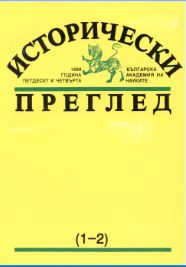Един документ за съдържанието и резултатите от съветско-югославско-българската тайна среща в Москва на 10 февруари 1948 г.
A Document about the Contents and Results of the Soviet-Yugoslav-Bulgarian Secret Meeting in Moscow on February 10, 1948
Author(s): Vesselin AngelovSubject(s): History, Political history, Recent History (1900 till today), Special Historiographies:, WW II and following years (1940 - 1949), History of Communism
Published by: Институт за исторически изследвания - Българска академия на науките
Summary/Abstract: Unknown notes of V. Kolarov, member of the Politburo of the Central Committee of the Bulgarian Workers’ Party (communists) and President of the People’s Republic of Bulgaria, fully re-create the contents of the tasks during the secret Soviet-Yugoslav-Bulgarian meeting on February 10, 1948. It is understood from them that the situation in the Balkans was a basic concern of the Soviet leadership. G. Dimitrov’s recent interview on a Balkan-Danubian Federation was only the occasion for which the meeting was held. Stalin did not wish a complication of the situation in this region of the world but its calming so as not to provoke a counteraction by the West which be did not want and which he could not and had no strength to resist. Stalin’s instructions to Bulgaria and Yugoslavia were clear: to discontinue gradually their support to the partisan movement, led by the Greek Communist Party. Greece to be left in the sphere of influence of the USA and England, Yugoslavia “temporarily” to give up its claims on Albania, and Bulgaria to proceed towards a gradual improvement of relations with Turkey. In exchange for that Stalin launched his idea of 1944–1945 of the establishments of a South-Slav Federation by Bulgaria and Yugoslavia, to which quite deliberately and as a bait he added Albania. It was the question of a tactical Stalinist move aimed at playing for time until Moscow solved in its favour the emerging problems with Tito and his elimination if necessary. The meeting was held also to warn the satellite states in the Balkans, and Tito at the most, that nothing could take place there without consultations in advance with and without the consent of Moscow. The principal goal of Stalin, therefore, was to bind the participants in the meeting by a written statement - agreement for obligatory mutual consultations on all important international (i.e. Balkan) questions. To the proposals responded only the Bulgarians who immediately signed such a statement. They accepted as justified the Soviet criticism, and all Stalin’s proposals and suggestions. Returning to Sofia, they gave shape to their consent with Moscow in a special decision of the Politburo of the CC of the Bulgarian Workers’ Party (communists), approving the Soviet criticism, the proposal to get down forthwith to the formation of a Federation with Yugoslavia and Albania, the signed statement of consultations and steps for improving relations with Turkey. The Yugoslavs did not accept such obligations and rejected the Soviet proposal for federating with Bulgaria and Albania as not topical, refusing all negotiations on this and other questions on this and other questions and the signing of the statement demanded by Moscow. Unsuccessful proved also the attempts of Moscow that followed the meeting to use Bulgaria as a bait in the efforts for talks and agreements which in a roundabout way would bind Yugoslavia to the USSR.
Journal: Исторически преглед
- Issue Year: 1998
- Issue No: 1-2
- Page Range: 228-246
- Page Count: 19
- Language: Bulgarian
- Content File-PDF

